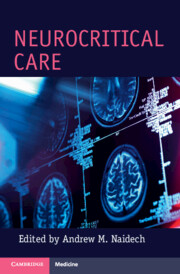Book contents
- Neurocritical Care
- Neurocritical Care
- Copyright page
- Contents
- Contributors
- 1 Introduction
- 2 Intracranial Pressure Monitoring and Management
- 3 Disorders of Temperature Regulation
- 4 Approach to Neuroimaging of the Brain, Vessels, and Cerebral Edema
- 5 Airway and Ventilator Management of the Neurologically Critically Ill Patient
- 6 Neurocritical Care Pharmacology
- 7 Intracerebral Hemorrhage
- 8 Correction of Coagulopathy
- 9 Subarachnoid Hemorrhage
- 10 Subdural Hematoma
- 11 Critical Care Management of Neurotrauma
- 12 Critical Care Management before and after Open and Intravascular Procedures
- 13 Shared Decision-Making in the Neuro-ICU
- 14 Status Epilepticus and EEG Monitoring
- 15 Evaluation of the Comatose Patient and Overview of the Brain Death Examination
- Index
- References
8 - Correction of Coagulopathy
Published online by Cambridge University Press: 19 May 2022
- Neurocritical Care
- Neurocritical Care
- Copyright page
- Contents
- Contributors
- 1 Introduction
- 2 Intracranial Pressure Monitoring and Management
- 3 Disorders of Temperature Regulation
- 4 Approach to Neuroimaging of the Brain, Vessels, and Cerebral Edema
- 5 Airway and Ventilator Management of the Neurologically Critically Ill Patient
- 6 Neurocritical Care Pharmacology
- 7 Intracerebral Hemorrhage
- 8 Correction of Coagulopathy
- 9 Subarachnoid Hemorrhage
- 10 Subdural Hematoma
- 11 Critical Care Management of Neurotrauma
- 12 Critical Care Management before and after Open and Intravascular Procedures
- 13 Shared Decision-Making in the Neuro-ICU
- 14 Status Epilepticus and EEG Monitoring
- 15 Evaluation of the Comatose Patient and Overview of the Brain Death Examination
- Index
- References
Summary
Coagulopathy is the loss of balance between hemostatic and fibrinolytic processes resulting in excessive bleeding, intravascular thrombosis, or abnormalities in coagulation testing. It is frequently encountered in the neurocritical care unit and can contribute to poor outcomes. Coagulopathies present unique challenges to the neurointensivist, where early recognition and appropriate management are key. In this chapter, we will discuss techniques to assess coagulopathies as well as treatment strategies for the brain-injured patient.
- Type
- Chapter
- Information
- Neurocritical Care , pp. 147 - 163Publisher: Cambridge University PressPrint publication year: 2022



